Products You May Like
Review info
Platform reviewed: PS5
Available on: PS5, Xbox Series X|S, PC
Release date: June 18, 2024
Still Wakes the Deep is a beautifully crafted juxtaposition of the manmade, natural, and supernatural. This narrative-led, survival horror game from developer The Chinese Room is a brief but chilling adventure on the Beira D, a North Sea oil rig, set during the 1970s.
You play as Cameron ‘Caz’ McLeary, a humble electrician who has traveled to the rig for some escapism – in more than one sense. After the rig goes about its normal business on a normal December day, something happens. The rig changes. The crew changes. It soon becomes apparent that something else is now on board with Caz, and he must bring parts of the rig back from the brink in order to find crewmates and work out what’s going on.
You soon learn that you can never escape the entity attacking and changing the Beira D, so making your way off the rig with as many crew as you possibly can becomes Caz’s main goal.
The game’s rigged
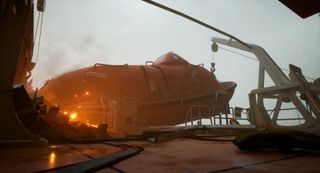
It’s become a quasi-cliche now to say that the setting or place of a video game is a character in and of itself, but I will bang this drum – particularly when it’s in such strong cases like with Still Wakes the Deep. It’s an important character to the story given the crew’s relationship with it, and the horror that it can hide, and it’s also an active member of the story given how it changes and reacts to Caz and the North Sea (and something else) over time.
The foundations of this importance come from the meticulousness of its recreation that then gives way to a relatable and real location with a strong sense of place. The Beira D has been created with details in mind and it shows; the handwritten menu boards, the nuts and bolts of paneling, the metal gangways and bridges on the exterior, and so much more all bring the Beira D brilliantly to life. However, it’s also a game setting that works on both a horror and gameplay level; the rig is perfect for some genuinely good environmental scares, accentuated by the wider, raging, dangerous North Sea.
Still Wakes the Deep is often at its most tense or scary when it’s just you and the oil rig
It’s simply an incredibly well-done and realized video game environment and setting and is a breathtaking deployment of Unreal Engine 5. The detail also extends to the audio with the Beira D groaning loudly at times, dripping quietly at others, and reacting to your movements always. It ramps up the immersion and really helps to put you right in Caz’s shoes.
Seeing the 1970s decor and style of the Beira D reinforces its datedness. For example, much of the decor is plain and utilitarian, and there are only limited and simple means of communication in the Beira D’s phone line – the latter particularly helps to ramp up the sense of isolation and solitude that you feel as Caz.
As a result, there’s certainly a distinct ‘USG Ishimura factor’ to the Beira D too. The way it groans and moans, creaks, and changes over the game, and acts as a character means that Still Wakes the Deep is often at its most tense or scary when it’s just you and the oil rig.
A-crew-ing leave

Best bit
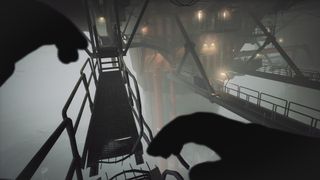
The times when Caz is alone in the Beira D are some of the most tense and gripping moments in the game. The way the rig reacts to you and your movements and is brought to life with pitch-perfect audio and visual design gives it a truly extraordinary sense of place.
The people aboard the Beira D are superbly voiced and acted and make the Beira D feel truly lived in. The crew are wonderfully presented as, and are so obviously, normal people. Most are just regular folk trying to earn a wage and live in the remote place they work in order to return to the mainland – and it shows. First through the terrific voice acting, but also through their behaviors and emotions; you can see one young worker so nervous for his day’s task he won’t eat breakfast at the beginning of the day; there’s chat about taking industrial action, and lighthearted banter between the crew. They’re all relatable, likable, and refreshingly normal.
A knock-on effect of this is that when this all changes down the line it has far greater impact. Seeing the crew members in states of genuine fear and terror, nigh-on panicking to get off the rig when trouble comes hits harder and makes it more impactful. This heightens the impact of seeing the fate of some crew members throughout the game too, something elevated also by the horrifying phone calls and environmental noises Caz encounters.
Caz particularly is wonderfully portrayed, really feels like a normal bloke, and is immediately relatable. We get glimpses into Caz’s past and character too, with him being on the Beira D as a means to escape – both in the poetic sense but also a literal one. He seems like a run-of-mill, working-class electrician who’s a bit rough around the edges.
Beira-ing down on you
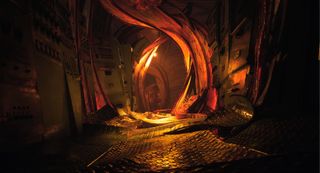
Caz’s relative normalcy is also mirrored in the limited range of actions and abilities he has during the game. As Caz, you’ll utilize only a few basic movements and interactive actions to traverse the Beira D, interact with phones and grates, and get around enemies.
The enemy in question is unknown in the early parts of the game. The tension and horror setup works superbly well because you just don’t know what has caused the chaos and what is affecting the crew. I really enjoyed trying to figure it all out with Caz and at the same rate as him.
The manifestation of your foe becomes more visible and clear as the journey goes on – it’s always there and ever-present, constantly having an effect on Caz and the Beira D. I’m loathe to give much away but its effect on the crewmates – some very specifically – is particularly harrowing. There are some very grotesque changes happening throughout the rig, fuelled by body horror.
Still Wakes the Deep’s story is a truly gripping one and I always felt compelled and intensely interested in playing the next bit to find out what’s going on
Encounters with enemies aren’t hugely long, but they do make for some heart-pounding chases and tight and intense sneaking sections. Given you only have two options in these moments – sneak past or sprint past – there’s some strategic thinking necessary, and your awareness of hidey-holes, items to throw and distract, and the route to the next door or your escape is paramount, adding to the tension.
Opening grates under pressure feels tense, reaching for a door wheel while looking back can be genuinely scary, and the use of the rig’s environment in darkness and light is very effective too.
This restrained and pared-back action is never frustrating or shallow, however, and given your investment in Caz, the crew, and finding out what exactly is happening to the rig, it’s never a chore to take part in.
McLeary as mud
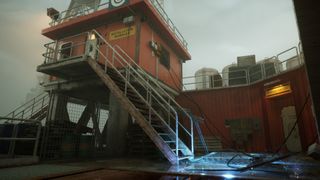
There are a few creases, however. You’re able to easily and quickly navigate the Beira D due to overt use of ‘video game yellow’ – a bit too easily and quickly, in reality. On one hand, this evokes Caz’s familiarity with his place of work and life, but on a practical level, it detracts and degrades the tension, especially in large enemy encounters. However, The Chinese Room is updating Still Wakes the Deep at launch with a patch that will give you the option to reduce the number of yellow paint indicators which should go a long way to mitigating this issue.
This also relates to the overall level of exploration and discovery on the Beira D – which is a little limited. While you get to revisit parts (that have changed) over the course of the game, I’d have loved more time and freedom to poke about every nook and cranny and discover things, and break free from the guided experience.
Another crinkle is that some environmental puzzles are very simple and would benefit from a bit more complexity. You can utilize Caz’s electrician training at times but pressing a button to change a fuse is about as complex as it gets.
Elsewhere, while it’s a punchy and short experience I was left pining for more upon finishing the game. It’s not a huge criticism, and it feels intentionally open, but I was immediately yearning to know more and do more, straight after rolling the credits.
A waking nightmare
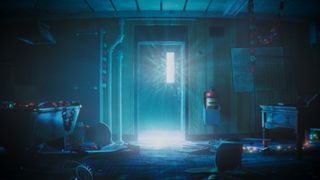
Still Wakes the Deep’s story is a truly gripping one and I always felt compelled and intensely interested in playing the next bit to find out what’s going on. The narrative, characters, and place, all work seamlessly together to pull you along, setting up the next areas, or tempting you on with an engrossing mystery.
The juxtaposition of man-made, natural, and supernatural I mentioned at the beginning is pulled off beautifully with all the game’s elements and makes for some superb tension and immersion.
While there are a few loose rivets, Still Wakes the Deep is a tremendous experience. It’s a game exceptionally well-grounded in its time and setting, has an engrossing story supported by strong writing and performances, and is truly elevated by the Beira D’s incredible atmosphere and sense of place.
Still Wakes the Deep isn’t a long experience – but it will stay with you.
Should I play Still Wakes the Deep
Play it if…
Don’t play it if…
Accessibility
Still Wakes the Deep has a dedicated accessibility tab in the options menu, which covers subtitle options like size and color, interface adjustments such as having objectives always displayed or not, and motion sickness settings like head bob and head roll amounts. There are three colorblind modes (Deuteranope, Protanope, and Tritanope), and there is also a high contrast mode, and the option to turn off flashing lights. There are two difficulty modes which offer two styles: a standard experience for more jeopardy; but also a story-focused mode that reduces the danger, making the game more accessible.
How we reviewed Still Wakes the Deep
I played Still Wakes the Deep for about six hours on PlayStation 5 with a DualSense Wireless controller and in that time I completed the main story and had a good poke about in every corner of the Beira D. I tested both difficulty modes to see the differences and took time to read all the lore I could find along the way. I played the game on my Samsung Q6F 4K QLED TV soaking up the audio through my Samsung soundbar as well as my SteelSeries Arctis Nova Pro Wireless headset.
